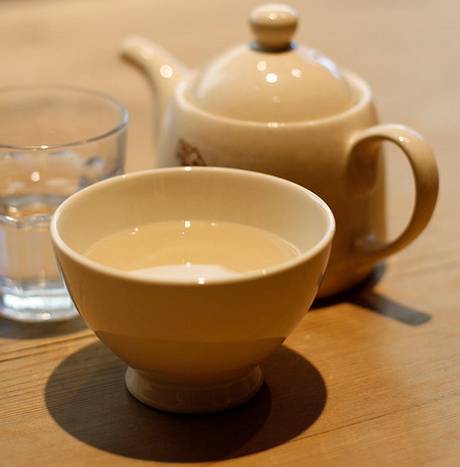Time for coffee and tea
An look at Ginger Tea
Tea Information
Ginger Tea - An Overview of the Potential Health Benefits
Ginger tea is an herbal tea that is made from the rhizome of ginger, which has the scientific name Zingiber officinale, and it is characterized with its aroma and flavor from the volatile of ginger which include zingerone, shogoals, and gingerols. Ginger tea is a good source of magnesium, potassium, and vitamins B6 and C. The rhizome of the ginger plant refers to the underground stem and this is what causes the aroma of the ginger tea.

Photograph by Andreas Hartmann.
Health Benefits of Ginger Tea
Ginger tea is widely used for medicinal purposes. Ginger tea is used as a digestive aid. The volatile oils of ginger, which are shogoal and gingerol, mainly cause the property of ginger tea to improve digestion and ease stomach cramps. This is because shogoal and gingerol help in neutralizing the acids that are in the stomach and secrete digestive juices. Ginger tea also helps relieve griping that is caused by diarrhea and invigorate the intestines and the stomach. Ginger tea helps stimulate weak appetites and secrete digestive enzymes that are essential to our bodies. Ginger tea also helps do away with food substances that are left inside the stomach that may cause metabolic toxicity.

Photograph by Imallergi.
Ginger tea is also used to relieve nausea and control vomiting. Gingerol in ginger helps block the reflex of the body to vomit and decrease oxidative products to help prevent nausea from occurring. Ginger tea helps fight motion sickness when traveling and it reduces dizziness.
Ginger tea also helps women relieve from muscular spasms and pains during the menstrual period such as menstrual cramps. Ginger tea also helps pregnant women to be prevented from severe nausea and vomiting.
Other Ginger tea benefits include the prevention of heart ailments such as heart attack and stroke because it helps prevent platelets to stick together.
Ginger tea also helps fight migraine, arthritis, and cancer. It also helps stimulate the circulatory system of the body by increasing blood flow to the surface of the skin and this helps relieve joint pains and rheumatoid arthritis. Olerosin and terpenes, which are active ingredients found in ginger, makes ginger tea help cleanse the lymph nodes and relieve mild constipation. Ginger tea also helps treat flu, cough, and colds because of its warming action.
Ginger tea also helps relieve sore throat and freshen bad breath. It also reduces blood sugar and increase perspiration.
How to Make Ginger Tea
Ginger tea can be made by first washing and then peeling the ginger. The ginger is then cut into small and thin pieces. Boiling water is then poured over the freshly sliced ginger and then covered to keep the aroma from escaping. It is steeped for around 15 minutes before it is strained. Sweeteners can be added to enhance the taste of the ginger tea.
Other Issues Regarding Ginger Tea
Ginger tea side effects: it should not be taken by patients who have high fever, ulcers, gallstones, and inflammatory skin complaints. Ginger tea should also not be taken too much by pregnant women because it may cause uterine contractions and it will do best to consult a doctor first. Ginger tea for around one week before a patient is going to undergo surgery because ginger is an anti-clogging agent.